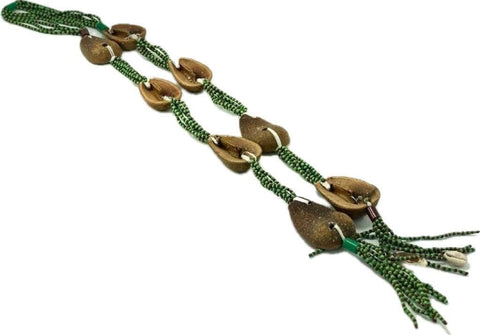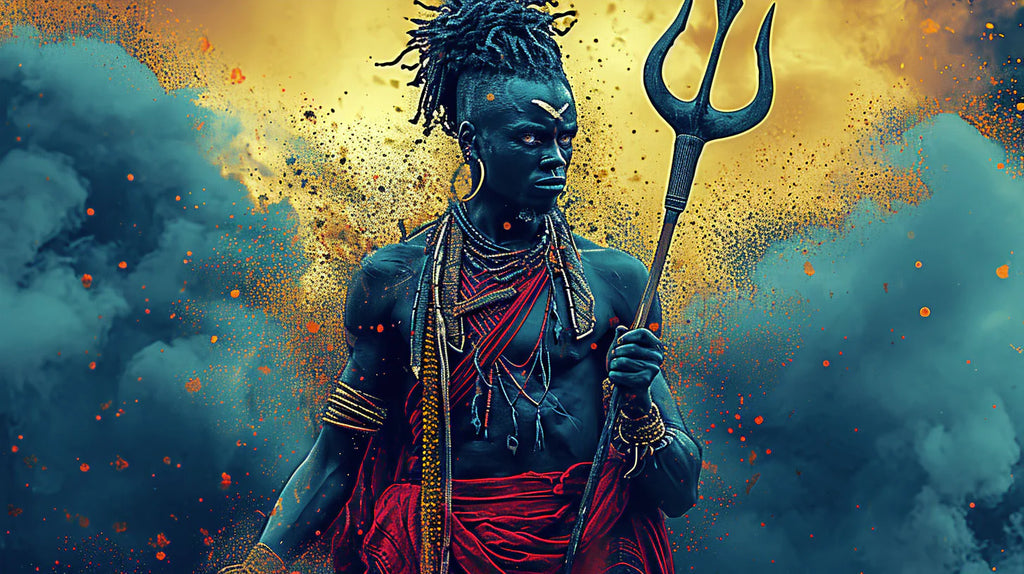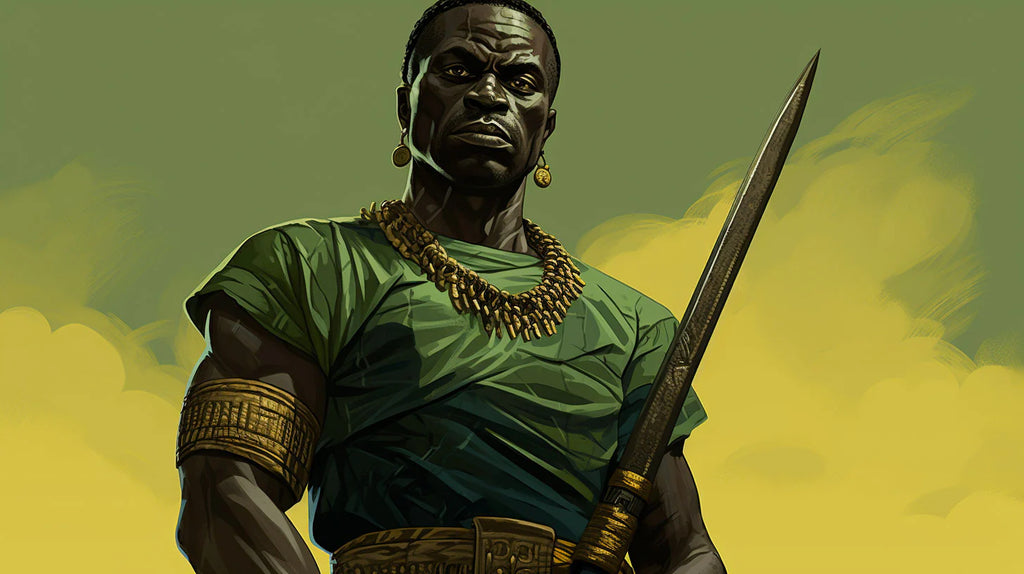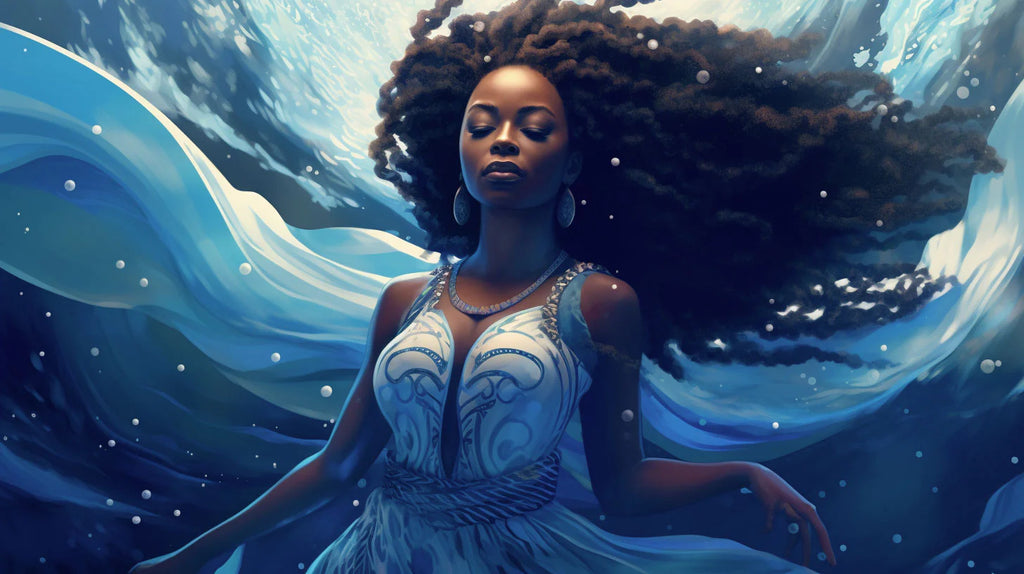Orunmila (Orula, Ifá): Yoruba Orisha of Wisdom & Divination
Gil SantosShare

Orunmila, known as the deity of wisdom and knowledge within the Yoruba religion, holds a pivotal role in guiding adherents through life's complexities. This orisha is revered for its ability to foresee the future and impart invaluable insights that navigate individuals towards favorable outcomes.
Delving into the world of Orunmila reveals a fascinating mix of stories, ceremonies, and lessons that highlight its importance in different cultures that follow Yoruba beliefs. The exploration of Orunmila's influence not only enriches understanding but also connects individuals to a deeper spiritual lineage, highlighting the enduring relevance of ancient wisdom in contemporary society.
Key Takeaways
- Orunmila, a central deity in Yoruba religion, embodies wisdom and divination, offering a rich spiritual guide for followers seeking insight and understanding.
- Understanding Orunmila's role in Yoruba religious practices can deepen one's appreciation for the complexities and nuances of this spiritual system, emphasizing the importance of wisdom and foresight in daily life.
- Orunmila is known by various names across different religions, highlighting the interconnectedness of spiritual traditions and the universal quest for wisdom.
- The attributes and characteristics of Orunmila, such as his deep knowledge and ability to foresee the future, serve as aspirational qualities for individuals striving for personal growth and enlightenment.
- The mythology surrounding Orunmila's rise to prominence not only entertains but also imparts moral lessons on the virtues of wisdom, patience, and understanding.
- The relationship between Orunmila and other Orishas, along with his syncretism with Catholic saints, illustrates the adaptability and syncretic nature of religious beliefs, reflecting how different cultures can find common ground in their spiritual practices.
Orunmila: Deity of Wisdom and Divination
Divine Knowledge
Orunmila, a prominent deity in the Yoruba religion, represents wisdom and knowledge. He is seen as a master diviner who guides individuals towards their destiny. As the central figure in Ifá tradition, his teachings are vital for understanding life's mysteries.
Orunmila's divine knowledge spans all aspects of existence. He uses this insight to assist people in navigating their lives more effectively. Through divination rituals, he communicates guidance and warnings from the divine realm.
Divination Practices
The process of divining with Orunmila involves several key elements, including a divining board and specific rituals known as Ifá divination. These practices allow priests to interpret Omens and provide counsel based on Orunmila's wisdom.
- The divining board serves as the physical medium through which messages from Orunmila are received.
- Priests trained in these methods become conduits for his profound insights into human destiny.
These ceremonies not only predict future events but also offer solutions for avoiding misfortune or achieving good fortune.
Master Diviner
As a supreme deity of divination, Orunmila holds a unique position among deities. His role extends beyond mere prediction; he shapes destinies by imparting sacred knowledge to those seeking it.
His expertise makes him an indispensable figure during significant life events where guidance is sought. Whether it’s matters of health, prosperity, or spiritual growth, consulting Orunmila can lead to beneficial outcomes.
Pathways to Destiny
Belief in Orunmila underscores the importance of understanding one’s path in life. Followers seek his advice through various means:
- Participating in divination ceremonies.
- Consulting with priests who serve as intermediaries between humans and the divine messenger.
- Reflecting on teachings within Ifá literature that recount stories demonstrating moral lessons.
This engagement with divine wisdom helps individuals make informed decisions aligning with their true purpose.
Different Names for Orunmila in Different Religions
Ifa in Yoruba
Orunmila holds a significant place in the West African Yoruba religion. Here, he is primarily known as Ifa. This name emphasizes his crucial role in divination practices. The Yoruba people regard him as the deity of wisdom and knowledge. They turn to him for guidance on their future.
The process of divination under Ifa involves intricate rituals. These rituals require a deep understanding of the signs and symbols that communicate Orunmila's messages. Practitioners, known as Babalawos, are highly respected within the community.
Orula in Santería
In Cuban Santería, Orunmila goes by another name: Orula. This reflects his revered status as a source of wisdom and guidance for followers. Santería blends elements from various traditions including Catholicism with African religions brought over during colonial times.
Followers seek out Orula’s counsel when facing difficult decisions or obstacles in life. His blessings are believed to protect against misfortune and bring clarity to one's path.
Regional Variations
Across different African diaspora religions like Afro-Brazilian, Orunmila is called by various names due to regional linguistic variations.
- In Brazil's Candomblé Ketu, he is often referred to simply as "Ifá."
- Haitian Vodou mentions him less directly but acknowledges similar spirits embodying his qualities.
These variations highlight how widespread the veneration of this deity has become across cultures influenced by African religious practices.
Each tradition adapts its worship methods according to local beliefs while maintaining core aspects related to divination and wisdom-seeking from Orunmila/Ifa/Orula.
|
Name |
Religion |
Country |
|---|---|---|
|
Orunmila |
Yoruba, Ifá |
Nigeria, Benin |
|
Orula |
Santería, Candomblé |
Cuba, Puerto Rico, Brazil |
|
Ifá |
Yoruba, Ifá, Candomblé, Santería |
Nigeria, Benin, Cuba, Puerto Rico, Brazil |
|
Eleri Ipin |
Yoruba, Ifá |
Nigeria, Benin |
|
Orun |
Yoruba, Ifá |
Nigeria, Benin |
By recognizing these different names and roles across religions, we gain insight into how cultural exchange shapes spiritual practices around the world. Understanding these distinctions can deepen our appreciation for each belief system’s unique interpretation of divine guidance through Orunmila.
Attributes and Characteristics of Orunmila
Symbolic Colors
Orunmila is often associated with green and yellow colors. These colors are not chosen at random but carry deep symbolic meanings. Green represents wisdom, a key attribute of Orunmila. It signifies growth, harmony, and freshness.
Yellow symbolizes power along with joy and energy. This color combination reflects Orunmila's dual nature as both a wise sage and a powerful deity. Followers believe that wearing these colors can attract Orunmila's blessings.
Sacred Tools
Among the symbols representing Orunmila, two items stand out: the divination chain (Opele) and palm nuts (Ikin). The Opele is used in Ifá divination to communicate with the spiritual realm. It consists of eight half-nuts tied on a chain.
The Ikin are sacred palm nuts used in rituals and consultations. They hold immense significance in connecting with Orunmila’s wisdom. Both tools are essential for priests (babalawos) to interpret messages from the divine.
Virtuous Traits
Orunmila is celebrated for his patience, an admirable quality that teaches believers the value of waiting for the right moment before acting. His patience allows him to make thoughtful decisions without rushing.
His foresight is another cornerstone characteristic, enabling him to predict future events accurately. This ability has earned him great respect among followers who seek guidance on their life paths. Lastly, his understanding of human nature makes him relatable despite being a deity. He recognizes human flaws yet offers solutions through guidance rather than punishment.
Mythology: Stories of Orunmila's Rise
Journey to Divinity
Orunmila's path to becoming the deity of divination is a tale rich with challenges and growth. His journey was not simple. It was filled with trials that tested his wisdom and character.
According to mythological tales, Olodumare, the supreme deity in Yoruba religion, handpicked Orunmila as the custodian of divine wisdom owing to his exceptional intelligence. This selection established Orunmila as one of the prominent orishas, or deities, within the Yoruba pantheon.
The stories surrounding Orunmila's ascent to godhood vividly portray his journey on earth and the various challenges he encountered along the way. These trials served as tests that evaluated his wisdom and determination. Despite facing numerous obstacles, Orunmila remained steadfast in his pursuit of knowledge.
Throughout his earthly sojourn, Orunmila sought guidance from Olodumare and other gods such as Ogún, Oshún, Sàngó, and Obatalá. Their divine counsel guided him towards acquiring profound knowledge and understanding about the universe and its workings. Through perseverance and unwavering devotion to learning, he gradually amassed a wealth of wisdom that surpassed that of any mortal.
Orunmila's rise to becoming the god of wisdom exemplifies how virtue is rewarded in Yoruba mythology. His dedication to seeking divine knowledge not only elevated him but also bestowed upon him immense power and authority over matters pertaining to wisdom. As a result, he became an essential figure in guiding individuals on their life paths by providing insightful divinations known as Ifá readings.
In Yoruba cosmology, it is believed that Olodumare entrusted Orunmila with a special chain known as "Opele." This sacred instrument serves as a conduit through which divine messages are channeled during Ifá consultations.

Through this medium, Orunmila imparts profound insights into people's lives based on their specific circumstances.
The stories surrounding Orunmila's journey highlight not only his personal growth but also shed light on the creation of the universe and its rulers. They emphasize the interconnectedness between gods and humans, showcasing how divine guidance plays a pivotal role in shaping individual destinies.
Interactions with Deities
Orunmila interacted with various deities during his rise, each interaction teaching him valuable lessons.
One significant encounter was with Eshu, the trickster god. Eshu challenged Orunmila in ways that forced him to think differently about problems and solutions. From this relationship, Orunmila learned the importance of perspective in understanding life’s puzzles.
He also sought counsel from Ogun, god of iron and war, who taught him about strength—not just physical but mental resilience too. These interactions highlight how collaboration can lead us down paths we never expected but ultimately need for growth.
Wisdom Over Challenges
The tales often emphasize Orunmila’s use of wisdom over brute force when faced with challenges.
For instance, there was a time when drought plagued the land. Instead of seeking a quick fix or giving up hope, Orunmila consulted Ifa (divination) for guidance on how best to serve his community during such trying times.
This approach saved many lives and further established his significance among both gods and humans alike as a beacon of hope and wisdom.
The Relationship of Orula with Other Orishas
Close Ally: Eshu
As mentioned before, Orunmila holds a close relationship with Eshu. This bond is crucial for spiritual growth and communication. Eshu serves as the messenger between orishas and humans. He uses various mediums like cowrie shells for divination.
This partnership ensures messages are clear and accurate. Their collaboration brings harmony to the spiritual and physical worlds. It helps followers understand their paths better.
Harmonious Ogun
Ogun's connection with Orunmila is based on protection and strength. As the god of iron, Ogun offers his shield to those under Orunmila's guidance. They work together to safeguard individuals from harm.
Their relationship emphasizes mutual respect and support. Followers often seek blessings from both for courage in life's battles.
Collaborative Yemoja
Yemoja, known as the mother of all orishas, shares a deep bond with Orunmila too. They focus on human welfare together.
Orunmila consults Yemoja in matters regarding life’s journey and well-being. She brings nurturing energy that complements his wisdom perfectly.
-
Pros of these relationships:
- Enhanced communication
- Stronger protection
- Nurturing support
- Balanced spiritual guidance
-
Cons:
- Misinterpretation if not properly guided
- Over-reliance on one aspect can imbalance personal growth
These partnerships among orishas highlight how interconnectedness leads to balanced living—both spiritually and physically.
Orula's Syncretism With Catholic Saints
Cuban Santería
In Cuba, the worship of Orula intertwines with that of Saint Francis of Assisi. This connection stems from their shared values. Both are known for their humility and compassion. Devotees see in Saint Francis a reflection of Orula's spirit.
The practices involve prayers and rituals that honor both entities. Priests and priestesses blend Catholic traditions with African religious rites. They use herbs, sacred texts, and fronds in ceremonies. This syncretism is a testament to cultural resilience among enslaved Africans.
Brazilian Candomblé
In Brazil's Candomblé, Orula finds a counterpart in Saint Anthony. The link lies in their association with lost things and miracles. Followers believe that invoking either can bring about good things or recover what is lost.
Worship includes offerings, prayers, and the use of sacred signs by ifa priests. These elements highlight the merging of religious practices from different cultures. It showcases how devotees adapted to new environments while keeping their faith alive.
This blending serves as an example of tradition preserving its core teachings despite external pressures.
By integrating aspects of Catholic saints into the worship of Orunmila orisha, devotees have demonstrated remarkable adaptability and creativity under challenging circumstances.
- They maintained connections to African roots.
- Simultaneously embraced elements from dominant religions around them.
Such adaptations ensured the survival and continuity:
- Of essential beliefs
- Practices across generations
It highlights the dynamic nature:
- Of religion
- Its ability to evolve
Cultural adaptation plays:
- A crucial role
- In sustaining spiritual heritage amidst adversity
Closing Thoughts
Orunmila, the Orisha of wisdom and divination, stands as a pivotal figure in Yoruba religion and its diaspora manifestations. Through the exploration of his attributes, roles, and relationships with other deities, one gains insight into the complex tapestry of beliefs that form the foundation of Yoruba spirituality. His syncretism with Catholic saints illustrates the adaptability and resilience of these spiritual practices in the face of historical challenges. This synthesis not only highlights the dynamic nature of religious evolution but also underscores the enduring relevance of Orunmila's wisdom in guiding adherents through life's uncertainties.
The stories and teachings associated with Orunmila offer invaluable lessons on morality, decision-making, and the importance of knowledge. They invite further study and reflection on how ancient wisdom can inform contemporary life. For those intrigued by Orunmila's rich legacy, delving deeper into Yoruba religious practices promises a journey filled with enlightenment and discovery.
Frequently Asked Questions
What is Orunmila known for in the Yoruba religion?
Orunmila is revered as the deity of wisdom and divination. He plays a crucial role in guiding individuals through the use of Ifa divination, helping them to make informed decisions and understand their destinies.
How does Orunmila influence Yoruba religious practices?
Orunmila significantly impacts Yoruba religious practices by serving as a central figure in Ifa divination. This practice allows practitioners to access advice and insights from ancestors and deities, with Orunmila being a primary source of this wisdom.
Are there different names for Orunmila across various religions?
Yes, Orunmila is known by different names in various religions. These variations reflect his widespread recognition and importance across multiple cultural contexts related to African traditional religions.
What are some attributes associated with Orunmila?
Attributes commonly associated with Orunmila include profound wisdom, foresight, and mastery over the art of divination. He is often depicted holding tools used for Ifa divination, symbolizing his connection to knowledge and destiny.
Can you share a myth involving Orunmila's rise?
One popular myth recounts how Orunmila earned his status through demonstrating unparalleled wisdom among the orishas (deities), using his insight to resolve complex dilemmas that others could not solve.
How does Orula relate to other orishas within Yoruba mythology?
Orula (another name for Orunmila) holds a unique relationship with other orishas as he possesses deep understanding of fate and destiny which even surpasses theirs. His counsel is sought after by both deities and humans alike due to this expertise.
What Catholic saint is syncretized with Orula?
Orula is often syncretized with Saint Francis of Assisi within Santería, reflecting shared themes of humility, peace, and guidance among followers who practice this blend of Yoruba religion and Catholicism.
About the Author
Gil Santos
With over 20 years of experience in various narrative mediums, Gil Santos is the singular mind behind Culture Bay. His journey began as a lyricist and web developer, later expanding into crafting dynamic conference presentations and engaging YouTube sketches. This diverse background has allowed him to hone his storytelling skills across different fields. Santos' lifelong passion for sci-fi and fantasy, combined with his knack for interactive storytelling, culminate in Culture Bay - a fusion of innovative ideas and engaging narratives intended for all to enjoy.



